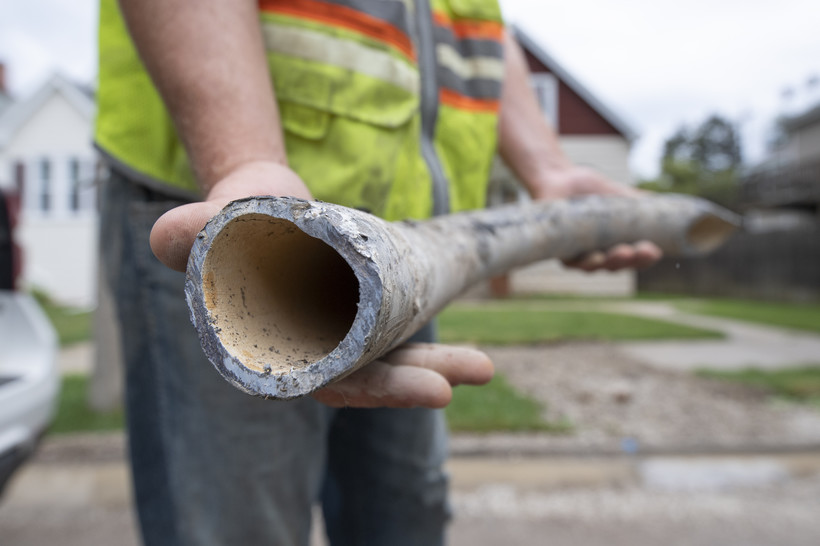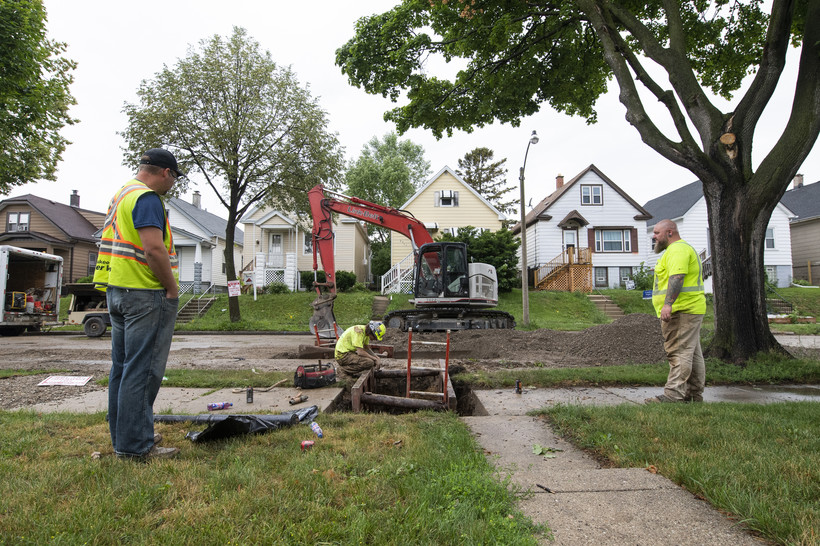State Will Get $139 Million Federal Funds for Water Infrastructure
Around $81 million will be set aside for replacement of lead pipes.

Tom Iglinski, an engineering technician with the city of Milwaukee, holds up a replaced lead service line on June 29, 2021. Isaac Wasserman/Wisconsin Watch
Wisconsin is set to receive around $139 million to upgrade drinking water infrastructure later this year, and more than half of that money will go toward replacing lead service lines.
The Wisconsin Department of Natural Resources is slated to receive the money in October as part of annual funding for the state’s Safe Drinking Water Loan Program. The money includes supplemental funding as part of $6 billion awarded nationwide through the bipartisan infrastructure law for projects to ensure safe drinking water.
The largest boost this year is funding for lead line replacement. Last year, Wisconsin received $48.3 million to replace lead lines. This year the state will get $81.2 million.
“We’re very excited about the additional funding and what it means for the communities and the water utilities in Wisconsin,” Ritchie said.
The funding also includes $13 million for emerging contaminants like PFAS. Perfluoroalkyl and polyfluoroalkyl substances are a class of thousands of synthetic chemicals widely used by industry since the 1940s. They’ve been used in everyday products like nonstick cookware and firefighting foam. The chemicals don’t break down easily in the environment. Research shows high exposure to PFAS has been linked to kidney and testicular cancers, fertility issues, thyroid disease and reduced response to vaccines over time. A growing number of communities statewide have detected PFAS in public wells, including Eau Claire, La Crosse, and Wausau.
Ritchie expects to see more demand for financial assistance through the program this year. In October 2022, communities submitted their intent to apply for more than $594 million to fund future projects for this year and beyond.

From left: Tom Iglinski, Jericho Gomez and Ryan DeBelak are part of a four-person crew working to replace a lead water service pipeline in Milwaukee on June 29, 2021. Isaac Wasserman/Wisconsin Watch
The state awarded $63 million in loans to nearly 50 projects for this fiscal year, and around $19.6 million is principal forgiveness that communities won’t have to pay back. That’s roughly half of the $122 million in loans Wisconsin awarded for fiscal year 2022. Ritchie noted cities like Milwaukee and Sheboygan received half of overall funds awarded for major projects. He added many communities likely waited to apply for infrastructure law funds until the federal government provided guidance on the law’s requirements to build projects with domestic iron and steel.
In the last two years, Wisconsin had a program for private lead line replacement that was funded through the transfer of $64 million from its Clean Water Loan Fund. Ritchie said that built momentum on replacing lead lines that he expects will continue under additional funding through the bipartisan infrastructure law.
In 2019, the city’s water exceeded the federal action level of 15 parts per billion under which systems are required to replace lead pipes.
The city began exploring whether to replace 7 percent of its lead lines each year, according to Jill Weiss, the city’s utilities director.
Instead, the city embarked on a $5.3 million project that removed around 1,000 public and private lead lines in 2021 that touched roughly 700 properties. She said they received a $3.5 million loan from the DNR to replace 653 private lead lines.
She said it only took one year instead of 15 years to replace those lines. The city also received approval to raise water rates to help pay for a 20-year loan that funded replacement of public lead lines.
“The more money that can be put into this, the better,” Weiss said. “It is definitely a health risk, especially for women that are pregnant, children under the age of five.”
Children are more vulnerable to lead poisoning, which can cause developmental issues among other health problems.
There are around 170,000 lead service lines in communities statewide, and the majority are in Milwaukee.
The state’s largest city has around 67,000 lead water service lines that are still in use. The city replaced around 1,000 lead lines last year, and city officials hope to replace 1,200 this year. Federal funding could help accelerate the removal process. The city intends to apply for at least $37.2 million in safe drinking water loan funds to replace lead lines and water mains.
Wisconsin’s Democratic congressional delegation hailed the infrastructure law’s additional funding for drinking water system upgrades, including U.S. Sen. Tammy Baldwin, U.S. Rep. Gwen Moore, and U.S. Rep. Mark Pocan.
Communities can apply for loans for fiscal year 2024 through the end of June.
Listen to the WPR report here.
Wisconsin set to receive $139M for drinking water infrastructure upgrades was originally published by Wisconsin Public Radio.
If you think stories like this are important, become a member of Urban Milwaukee and help support real, independent journalism. Plus you get some cool added benefits.
More about the Lead Crisis
- Rep. Madison Proposes Restoring Local Control Over Lead Inspections - State Rep. Darrin Madison - Jan 6th, 2026
- $43 Million Later, MPS Says Classrooms Are Safe From Lead Dust - Corrinne Hess - Dec 18th, 2025
- MPS Buildings Cleared of Lead-Paint Risks after 10-Plus Months of Work - Milwaukee Public Schools - Dec 17th, 2025
- Wisconsin Moves to Require Lead Service Lines Replaced By 2037 - Danielle Kaeding - Dec 11th, 2025
- Gov. Evers, DNR Announce More Than $159 Million to Ensure Clean, Safe Drinking Water for Wisconsinites in 29 Municipalities - Gov. Tony Evers - Dec 10th, 2025
- EPA Announces $3 Billion in New Funding for States to Reduce Lead in Drinking Water - U.S. Environmental Protection Agency - Nov 25th, 2025
- Wisconsin Communities Get $282 Million for Drinking Water Projects - Danielle Kaeding - Nov 19th, 2025
- MKE County: County Launches Lead Abatement Program - Graham Kilmer - Nov 9th, 2025
- Milwaukee County Launches Lead Remediation Program to Reduce Lead-Based Paint Hazards in Homes in Suburban Communities - David Crowley - Nov 5th, 2025
- Wisconsin Improves Child Lead Testing Rates, Urges Continued Testing and At-Home Prevention - Wisconsin Department of Health Services - Oct 21st, 2025
Read more about Lead Crisis here




















